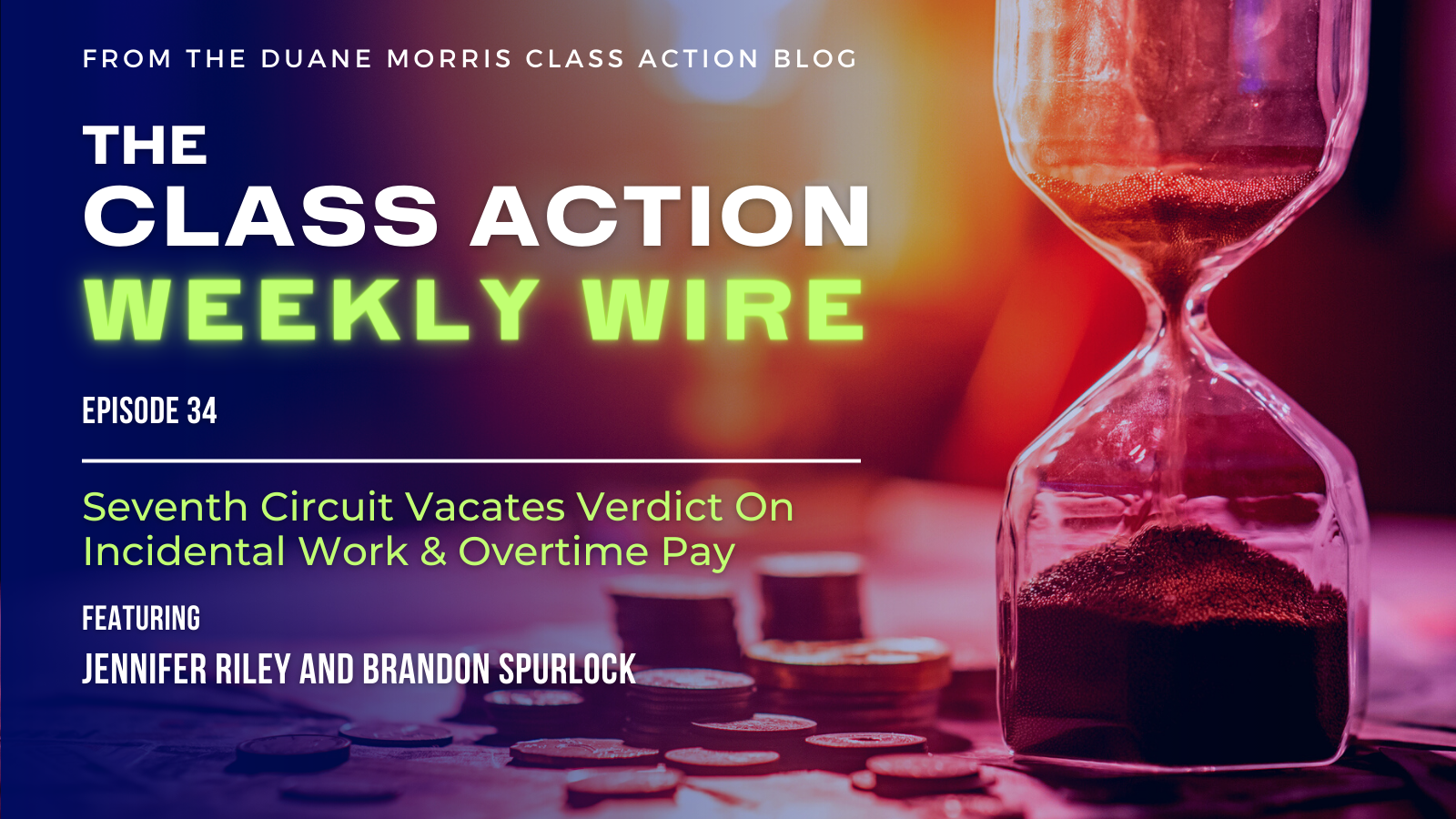Duane Morris Takeaway: This week’s episode of the Class Action Weekly Wire features Duane Morris partner Jennifer Riley and special counsel Brandon Spurlock with their discussion of a Seventh Circuit ruling issued last week that vacated a jury verdict of $225,000 in an FLSA overtime wage suit brought by field technicians regarding pre- and post-shift tasks.
Check out today’s episode and subscribe to our show from your preferred podcast platform: Spotify, Amazon Music, Apple Podcasts, Google Podcasts, the Samsung Podcasts app, Podcast Index, Tune In, Listen Notes, iHeartRadio, Deezer, YouTube or our RSS feed.
Episode Transcript
Jennifer Riley: Thank you for being here for the next episode of our Friday weekly podcast, the Class Action Weekly Wire. I’m Jennifer Riley, partner at Duane Morris, and joining me today is special counsel Brandon Spurlock. Thank you for being on the podcast, Brandon.
Brandon Spurlock: Thanks Jen. I’m very happy to be here.
Jen: So today on the podcast we are discussing a recent ruling by the Seventh Circuit in a wage & hour lawsuit brought in Illinois. It’s called Meadows v. NCR Corp. Brandon, can you tell us a little about the Fair Labor Standard Act, which is the statute that the plaintiff invoked in this case, to set the stage for our discussion?
Brandon: The Fair Labor Standards Act, or FLSA, is the federal regulation enacted by the U.S. Department of Labor that establishes minimum wage, overtime pay, recordkeeping, and youth employment standards affecting employees in the private sector and in Federal, State, and local governments.
Jen: Thank you for that background – and now, can you tell us a little about the plaintiff’s allegations in the NCR case?
Brandon: Absosutely. At issue in this case is the FLSA’s overtime regulation. This case was filed by a field technician of NCR, which is a company that makes ATM machines. The plaintiff asserted that NCR failed to pay overtime compensation. The plaintiff contended that NCR was routinely shorting field technicians’ wages by allegedly refusing to pay them overtime for hours they worked in place of breaks, or before and after their shifts ended. The plaintiff claimed he performed many “incidental” work activities before and after his work shifts and during meal breaks, for which he was not paid, including things like responding to emails and phone calls, stocking his work van with required materials for his job each day, and mapping out his work travels. NCR had argued that it agreed to pay workers for unauthorized overtime, so long as the hours were properly recorded using the company system.
Jen: So this is an interesting case, among other reasons, because it proceeded to trial. Brandon, can you tell our listeners a bit about what the jury concluded at the trial?
Brandon: Yes, indeed, the case did go to trial, and the jury returned a verdict for the plaintiff. The court approved the verdict and awarded the plaintiff approximately $225,000 in back overtime pay plus interest, plus attorney fees. NCR, however, requested a new trial. The trial court denied that motion, but on appeal the Seventh Circuit vacated the jury’s verdict and remanded the action.
Jen: So the Seventh Circuit disagreed with the jury’s findings. How did the court come to that conclusion?
Brandon: Good question. So the Seventh Circuit determined that the district court had erred in allowing the plaintiff to claim he was owed payment for hours he had worked, but had not recorded. The Seventh Circuit stated that under the FLSA, employees can only expect to be paid for “incidental activity … if two conditions are met: the employer elected to pay for such activities by contract, custom, or practice and the employee engaging in such activities complied with all the requirements imposed … by that contract, custom, or practice.” So here the Seventh Circuit concluded that the plaintiff had not met that second condition.
The Seventh Circuit then vacated the jury’s verdict and sent the case back to the district court for further proceedings on whether the plaintiff should get a new trial.
Jen: It will be interesting to see here what the future holds for this case. We will be sure to keep our listeners up to date on new developments. Brandon, thanks so much for joining me today and for the rundown on this ongoing dispute. Thanks everyone for tuning in.
Brandon: Thanks for having me Jen, and thank you listeners.
Jen: See you next week on the Class Action Weekly Wire!

